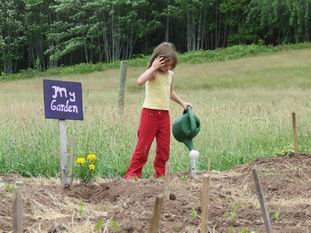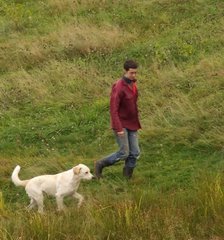
School Gardening - a Growing Adventure
My, how time flies. It's been almost two weeks since I last blogged, and I've received my first official complaint from "the readership." What have I been up to, if not blogging? Well, I've been preparing for a long-anticipated visit from a dear aunt, getting ready to host a WWOOFing family, and organizing a sleepover birthday party for a seven year old. (How'd THAT go? It was lots of fun, except for bedtime. A bit like playing a giant game of Whack-a-Mole...) So - back to the topic of School Gardening.
In early July, we planted a vegetable garden on the grounds of our little country school. July is late for planting, but we had to wait for volunteers to break new ground, disc and till the soil, and add compost. We were also delayed by a solid five weeks of rain, which turned the ground into such a marsh I almost gave up the vegetable idea in favour of rice.
But I'm getting ahead of myself. Why did we plant a vegetable garden at a rural school, in a valley with a strong farming heritage? Most school garden programs target city schools, where kids may be out of touch with the land and where their food comes from. Isn't a gardening program in the country a bit... redundant?
Sadly, it's not. Although many of the children in our school come from a heritage of farming, none of their ancestral family farms have survived the advent of industrial agriculture. Many of these rural-dwelling children have parents with jobs in town - or jobs out West. Their food comes from the grocery store. Most had never put a seed in the ground until we started the school garden.
That's ironic, when you consider that this river valley once supported hundreds of small, self-sufficient farms. The typical farm would have supplied its own dairy, eggs, meat, fruit, and vegetables, as well as its own firewood. There was a strong network of trade among the farms, and a tradition of mutual assistance. Of course, the work was labour-intensive, the days were long, and nobody got rich. But, as our county councillor recently remarked, "At least back then we couldn't be starved out of here."
The reasons for the decline of the family farm are complex, and a topic for another time. Suffice to say that starting a vegetable garden at the school is, at least in part, an attempt to reconnect the children with their own heritage. Now, I want to be clear that I'm NOT talking about approaching this as a "living history" lesson. This is not about keeping the past alive, or promoting a nostaligia for an obsolete method of farming. This is about sowing the seeds of revolution.
The small, sustainable family farm is not dead. It has taken a severe beating, yes, and it has hung on for a number of years by the barest of threads. But I believe that the small family farm is in the midst of a revival. In fact, I believe the family farm MUST be revived, if North Americans are going to cope with the coming crises resulting from Peak Oil and Climate Change. Relocalization of food production is going to become crucial. Industrialized agriculture, with its dependency on fossil fuels, is simply not sustainable. We need people who know how to grow food locally, without reliance on fossil fuel inputs (fertilizers, pesticides, fossil-fuel-driven implements, packaging, refrigeration, - all dependent on oil.)
When you teach children how to grow their own organic food, you're undertaking a powerful, political act. When a child experiences the physical connection between her hands, the soil, and the food that grows out of that soil, she has been directly empowered to think beyond the constraints of obsolete regulations, money, and power structures. The child discovers that she can use her own hands, her own mind, and her own labour to work with the soil and nurture the growth of healthy, delicious food. The result is a growth in self-confidence, physical strength, health, and awareness that she, too, grows out of the land.


1 comment:
Your comments are so very true! There has to be a revival of hte family farm. We are hoping/planning to do so in the near future. Even without the potential crisis of peak oil and climate change, we really do have a responsibility to live much more sustainably than we do.
My spouse and have started to look for our own plot of land up north.
Good for you - living in such a healthy and sustainable fashion. You are an inspiration!
Post a Comment